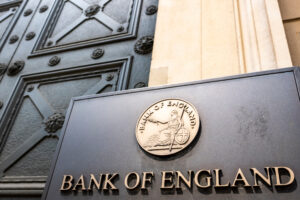
Interest rates are expected to be left unchanged as the Bank of England looks to balance the impact of higher rates on the UK economy.
Sluggish economic growth and signs that the country’s job market is slowing down have led to predictions that rates will be held at 5.25%.
Rates had been hiked previously in a bid to slow the pace of price rises and are at the highest level for 15 years.
The Bank of England, which sets rates, will reveal its decision at midday.
Money markets say there is a 92% chance that rates will be held.
Higher interest rates mean that the cost of borrowing money for things like mortgages and other loans goes up. However, it also means higher returns on savings accounts.
The Bank has been hiking rates since December 2021 in an effort to tackle inflation in the UK, which has been much higher than usual and put households under financial pressure.
Inflation, which is a measure of the rate of price rises for consumer goods, is currently at 6.7% annually and has fallen from its peak seen last year. However, it is still more than three times higher than the Bank of England’s 2% target.
By making it more expensive for people to borrow money, the Bank hopes households will cut back and buy fewer things, in turn leading to businesses slowing their price rises.
But it is a balancing act – if rates go up too quickly, consumers and businesses may cut back too heavily on spending and investment, which tends to drag on the economy and can lead to a recession.
The UK is not currently in recession but there have been concerns about weak growth, with the economy set to be a key area in the general election widely expected next year.
The impact of previous rate hikes also takes time to filter through.
While those with unfixed debt and variable or tracker mortgages will see almost immediate rises in costs, the majority of homeowners will only feel the pain of higher mortgage rates when fixed deals end, while the impact on employers tends to take about a year to kick in.
But when the Bank held interest rates in September, Governor Andrew Bailey said that there were “increasing signs” that higher rates were starting to hurt the economy.
On Wednesday, the US central bank, the Federal Reserve, decided to hold its key interest rate at 5.25%-5.5%, a 22-year high.
In the run-up to the Bank of England’s decision on Thursday, data on the economy has led analysts to predict rates will go unchanged for a second time.
Investec economist Sandra Horsfield said that the Bank could still decide to raise rates, but added “the case for raising rates further now does look somewhat weaker to us than at the last meeting”.
She pointed to recent economic data and said that while “it is not a fully coherent picture”, it was “one consistent with the economy at the early stages of entering a recession”.
Economists at RBC said in a note that the data “largely supported the decision to hold, pointing to a loosening in the labour market, slowdown in economic activity and easing inflation”.
But the Institute of Economic Affairs, a right-leaning think tank, urged the Bank to cut rates to avoid a recession.
“The Bank’s overly tight monetary stance is pushing mortgage lending down, companies are struggling to repay debt, insolvencies are rising, and households are withdrawing money to meet higher repayments,” said Trevor Williams, chair of a committee which monitors the Bank’s decisions and a former chief economist at Lloyds Bank.
Read more:
Bank of England predicted to hold Interest again




